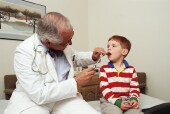Early diagnosis is associated with better long-term outcomes
WEDNESDAY, April 15, 2015 (HealthDay News) — The behavior of health care providers is likely a very important factor in delayed autism identification, according to new research published online April 14 in The Journal of Pediatrics.
A team led by Katharine Zuckerman, M.D., M.P.H., of the Oregon Health and Science University in Portland, compared the medical records of 1,420 children with autism against those of 2,098 children with other forms of delayed intellectual development. For children who later turned out to have an autism spectrum disorder, doctors and other health care providers were 14 percent less likely to have taken action — such as conducting developmental tests or referring the child to a specialist — in response to parents’ concerns about autism, compared to children from the other group. The researchers also found that health care providers were more likely to tell parents of children with autism that the child will “grow out of it.”
In the study, parents often had concerns about autism when their children were about 2, and discussed these concerns with a health care provider when their children were an average of 2.3 years old. However, children with autism in the study were typically not diagnosed with the disorder until about age 5 — nearly three years after parents first expressed their concerns to health care providers. “The behavior of health care providers is likely a very important factor in delayed autism identification,” Zuckerman said in a journal news release.
“We know that early identification of autism spectrum disorder is beneficial to children and their families,” Zuckerman said. “Unfortunately, many families experience long delays between when they first have concerns and when their child gets diagnosed with autism spectrum disorder.” According to the researchers, children with autism can develop symptoms even before they’re 2, and early diagnosis is associated with better long-term outcomes.
Copyright © 2015 HealthDay. All rights reserved.








